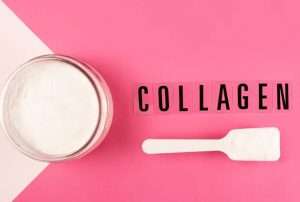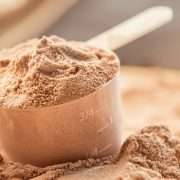Top 10 Collagen Boosting Foods Sources and More
Top 10 Collagen Boosting Foods Sources and More
What is Collagen?
Collagen is a stretchable, fibrous, thick mesh of interconnecting cell membranes extending underneath the entire length of your skin, giving it form and structure.
Around 80% of the skin is made up of collagen. It is the most abundant protein found in the human body. On a molecular level, collagen is made up of amino acid chains. Meaning, any form of protein intake helps in building collagen, by adding on to these amino acid chains.
Collagen is essentially a triple helix arrangement build from three amino acid chains packed together to form hard, insoluble, and strong fibres that bind cells to each other.
Several helices organize themselves to support structural tissues and provide them with the flexibility and agility to withstand forces.

Ageing reduces our capacity to form new collagen. Therefore, supplementation is a good way to prevent collagen loss and ensure skin hydration. We start losing collagen as early as our 20s or 30s and this is the reason for the sagging and wrinkle formation on our skin when we’re 60.
Effects of Collagen Loss on Body
Collagen loss is a natural process and aggravates overtime. Many external factors can contribute to the loss of collagen, such as exposure to UV rays, pollution, lifestyle choices or genetics.
As a part of ageing, we start losing collagen around the age of 30 and accelerates around 40s – leading to inevitable signs of ageing.
- Skin: As collagen breaks down with age, our skin becomes thinner, wrinkles start to show up and dehydration increases leading to sagging. Collagen keeps the skin firm and supple, without it skin loses its structure.
- Bone: Our bones get weaker as mineral and collagen levels decrease. Eventually, this causes the bones to get more fragile and breakable.
- Joints: Ageing causes wear tear in the joint cartilage and affects their functioning. This leads to pain and discomfort, making it difficult to stay active as we age.
- Muscles: Loss of muscle mass means loss of supportive connective tissue as we age. The loss of collagen in our body gradually impairs our ability to move freely, affecting our balance, gait and overall functionality.
However, collagen loss can be combated by watching our nutritional needs and altering our diet accordingly.
Collagen Boosting Foods You Can Eat To Boost Collagen Production
Consuming protein-rich food is the first step towards keeping your collagen levels intact. As it provides the body with amino acids that help to produce more protein compounds like collagen.
Apart from this, certain micronutrients also support collagen production, such as:
- Vitamin C – Mostly found in citrus fruits and some berries but also in kiwi, pineapple, peppers and broccoli
- Zinc – Bread, cereals, meats, dairy, shellfish
- Copper – Organ meats, cocoa, nuts and shellfish
- Glycine – Gelatin, chicken skin, pork skin
- Manganese – Tea, nuts, green vegetables
This pandemic coupled with the odd working hours and imposing sedentary lifestyle conditions has further necessitated the need to prioritize the well-being of our physical health.
There are plenty of collagen-rich foods available to help you boost collagen. Let’s take a look at some of the Collagen Boosting Foods
1. Citrus fruits

Vitamins C plays a major role in the early stage of the body’s production of collagen and is hence one of the most important nutrients. Thankfully it is widely available from a wide variety of sources especially fruits like lemons and oranges.
2. Berries

These fruit families, consisting of strawberries, blueberries, raspberries, etc, contain massive quantities of Vitamin C and are rich in flavonoids and antioxidants. Vitamin C helps in collagen production while the antioxidants help in maintaining the durability of the tissues.
3. Garlic

For something that is used mostly as a flavouring spice, garlic is surprisingly rich in sulphur, which helps prevent collagen from breaking down. So while the usual quantity of this isn’t much, slightly increasing the amount of what we consume daily, can go a long way in helping our body maintain collagen. But remember, too much garlic can also cause a lot of harm. So make sure to not have too much.
4. Green vegetables

This is probably one of the most important and widely used sources of collagen the world over. Green and leafy vegetables pack a punch when it comes to vitamins and minerals, but did you know they also help the collagen synthesis in our body. Things like spinach, kale, lettuce, etc all contain chlorophyll which gives them their green. And it has been observed in research that chlorophyll helps the body with collagen production.
5. Beans

Beans are one of the collagen boosting foods that are rich in protein to help collagen production, it also contains the micronutrient copper which is also a vital mineral
6. Tomatoes
One of the most nutrient-loaded fruits that is part of our daily diet. One full tomato can provide us with almost a third of our daily Vitamin C requirement along with a powerful antioxidant called lycopene.
7. Nuts
Most nuts are powerful sources of proteins for our bodies, be it almonds, cashews, groundnut, etc, But cashew nuts are one of the richest sources and they also contain large quantities of zinc and copper, minerals vital in synthesizing collagen
8. Pumpkin seeds

A rich source of zinc and often used in collagen supplements, these seeds help slow down the breakdown of collagen proteins.
9. Chia Seeds
This is one of the best sources of Omega-3 fatty acids which is otherwise richest in sea-fish. Chia seeds help in building healthier skin tissue and retain moisture which keeps the skin glowing
10. Chlorella
This is an alga, a single-celled organism that is processed and sold either in powder or tablet form. It is an excellent promoter of collagen synthesis as it contains a unique nutrient called Chlorella Growth Factor, which helps our cells and tissues repair themselves better.
Or else, you can simply follow this chart for more vegan collagen sources
| Nutrient Name |
Top Vegetarian Food Sources |
Measurement Amount |
Nutrient Amount |
| Proline (amino acid) |
Swiss Cheese |
100g |
3690 mg |
| Vitamin C (vitamin) |
Broccoli |
100g |
89.2 mg |
| Anthocyanin (flavonoid) |
Elderberries |
100g |
1993 mg |
| Copper (trace mineral) |
Raw Kale |
100g |
1.5 mg |
| Lysine (amino acid) |
Tofu |
100g |
450 mg |
| Arginine (amino acid) |
Tofu |
100g |
1250 mg |
| Vitamin A (vitamin) |
Dried Apricots |
100g |
12669 IU |
| Manganese (trace mineral) |
Lima Beans |
100g |
1.3 mg |
| Zinc (mineral) |
Wheat Germ |
100g |
16.7 mg |
You can also buy OLENA’s Wholefood Collagen Supplement from Amazon here















